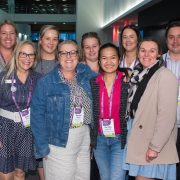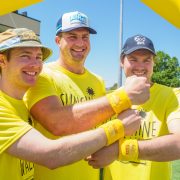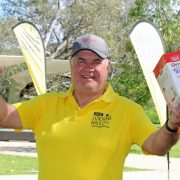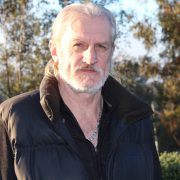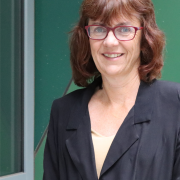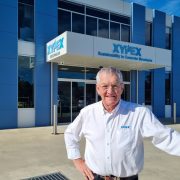Education: The crucial key to advancing cancer care
For us at the Trust Fund, Education is key to achieving our vision of ensuring our community members have access to high quality cancer treatment. Thus, when the application for staff to attend the Cancer Nurses Society of Australia (CNSA) Annual Congress arrived on our desk, the decision was an easy one.
The Congress provided the opportunity for Stephanie Sutherland, Rachel Wright, Michelle Paterson, Monique Mona, Karla McBroom, Kendra Immoliap and Craig Gilbertson to learn more about advancements in cancer nursing and the integration of new and innovative digital health technologies into patient care.
Michelle Patterson, Registered Nurse in Ramsay Health Day Oncology Unit, was thrilled to be able to attend the congress.
“We need to be able to attend annual conferences to maintain and build on our knowledge and work practices. Just a few of the benefits I obtained through attending include increasing my knowledge of the fundamentals of genomics in cancer care, learning about innovative technologies and services, and dressing management. Many thanks for allowing me to attend this year’s conference, funding it myself was not possible” Michelle said.
In addition to attending the Congress, Craig Gilbertson, Acting Nurse Unit Manager of Wodonga Theatre, presented his research study “Exploring the feasibility of using virtual reality as a non-pharmacological intervention to alleviate patient fear of needles in adults during medical treatment.”
But what does this mean in plain language? Craig conducted research to find out if adults with needle phobia could be assisted via a new Virtual Reality (VR) application. Most of us do not like needles or being cannulated, but for those who have needle phobia, their physical response may include a fainting episode. According to Craig “Unfortunately this fainting response represents an immediate medical emergency in a hospital environment which not only upsets the patient, but also delays the patient’s procedure.”
Craig wanted to find out if patients with needle phobia would be more relaxed if they wore a VR headset, thus enabling a quick and low stress procedure. The VR headset was programmed with several Australian landscapes, from a beautiful sunny beach to the snow-capped mountains, with patients choosing where they ‘wanted to visit.’
And the results? The results were overwhelmingly conclusive. Both patients and the staff involved report that “Patient stress was alleviated, and they were no longer terrified of the needle” Craig said. This approach took the patients ‘virtually out’ of the clinical setting, thus allowing them to relax, and the staff the opportunity to deliver a quick procedure.
Craig’s presentation represented the culmination of 4.5 years of study in the Master of Applied Science by Research. Craig has not only achieved his goal of completing his Masters, but also continued to work full time during this time. For anyone who has juggled fulltime work and study, you will understand the enormity of Craig’s achievement. We very much look forward to reading more about Craig’s research and congratulate him on his achievement.
And after 4.5 years of all-consuming research and study, what is next for Craig? A holiday to catch up on sleep!
All nursing participants expressed thanks to all community members who have made donations to the Trust Fund. Without your support they tell us, the opportunity for further education is challenging.
Pictured are Monique Mona, Diane Delany, Stephanie Sutherland, Rachel Wright, Karla McBroom, Kendra Immoliap, Melita Miller, Michelle Paterson, and Craig Gilbertson.

